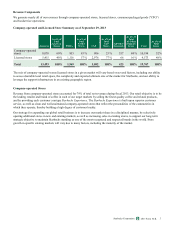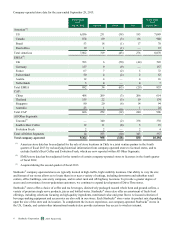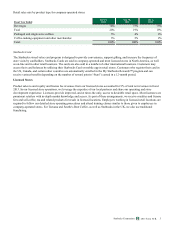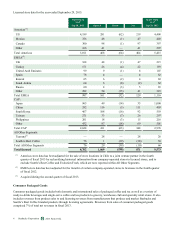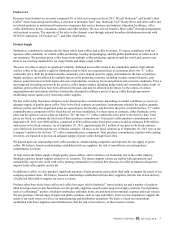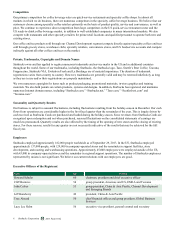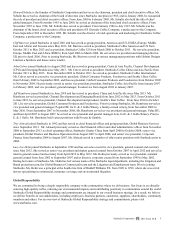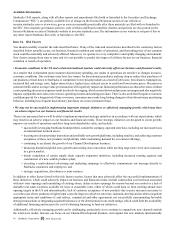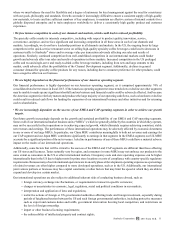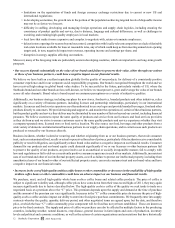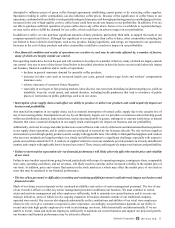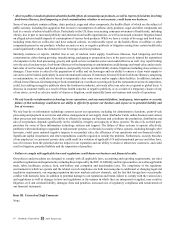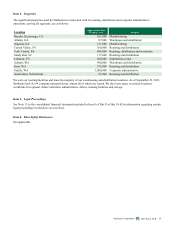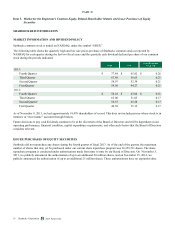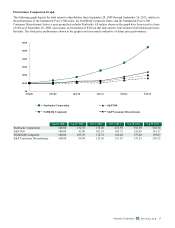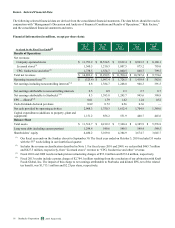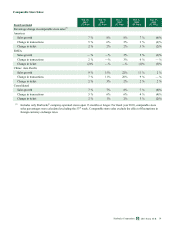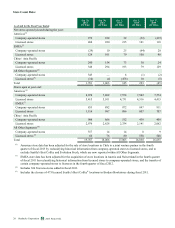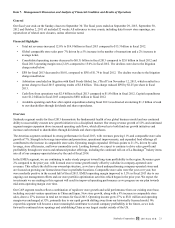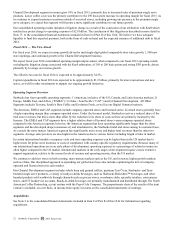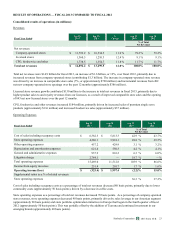Starbucks 2013 Annual Report Download - page 21
Download and view the complete annual report
Please find page 21 of the 2013 Starbucks annual report below. You can navigate through the pages in the report by either clicking on the pages listed below, or by using the keyword search tool below to find specific information within the annual report.
13
attempted to influence prices of green coffee through agreements establishing export quotas or by restricting coffee supplies.
Speculative trading in coffee commodities can also influence coffee prices. Because of the significance of coffee beans to our
operations, combined with our ability to only partially mitigate future price risk through purchasing practices and hedging activities,
increases in the cost of high-quality arabica coffee beans could have an adverse impact on our profitability. In addition, if we are
not able to purchase sufficient quantities of green coffee due to any of the above factors or to a worldwide or regional shortage,
we may not be able to fulfill the demand for our coffee, which could have an adverse impact on our profitability.
In addition to coffee, we also purchase significant amounts of dairy products, particularly fluid milk, to support the needs of our
company-operated retail stores. Although less significant to our operations than coffee or dairy, other commodities including but
not limited to those related to food inputs, such as tea, produce, baking ingredients, and energy, are important to our operations.
Increases in the cost of dairy products and other commodities could have an adverse impact on our profitability.
• Our financial condition and results of operations are sensitive to, and may be adversely affected by, a number of factors,
many of which are largely outside our control.
Our operating results have been in the past and will continue to be subject to a number of factors, many of which are largely outside
our control. Any one or more of the factors listed below or described elsewhere in this risk factors section could adversely impact
our business, financial condition and/or results of operations:
• declines in general consumer demand for specialty coffee products;
• increases in labor costs such as increased health care costs, general market wage levels and workers' compensation
insurance costs;
• adverse outcomes of current or future litigation;
• especially in our larger or fast growing markets, labor discord, war, terrorism (including incidents targeting us), political
instability, boycotts, social unrest, and natural disasters, including health pandemics that lead to avoidance of public
places or restrictions on public gatherings such as in our stores.
• Interruption of our supply chain could affect our ability to produce or deliver our products and could negatively impact our
business and profitability.
Any material interruption in our supply chain, such as material interruption of roasted coffee supply due to the casualty loss of
any of our roasting plants, interruptions in service by our third party logistic service providers or common carriers that ship goods
within our distribution channels, trade restrictions, such as increased tariffs or quotas, embargoes or customs restrictions, or natural
disasters that cause a material disruption in our supply chain could negatively impact our business and our profitability.
Additionally, our food, beverage and other products are sourced from a wide variety of domestic and international business partners
in our supply chain operations, and in certain cases are produced or sourced by our licensees directly. We rely on these suppliers
and vendors to provide high quality products and to comply with applicable laws. Our ability to find qualified suppliers and vendors
who meet our standards and supply products in a timely and efficient manner is a significant challenge, especially with respect to
goods sourced from outside the US. A vendor's or supplier's failure to meet our standards, provide products in a timely and efficient
manner, and comply with applicable laws is beyond our control. These issues could negatively impact our business and profitability.
• Failure to meet market expectations for our financial performance will likely adversely affect the market price and volatility
of our stock.
Failure to meet market expectations going forward, particularly with respect to operating margins, earnings per share, comparable
store sales, operating cash flows, and net revenues, will likely result in a decline and/or increased volatility in the market price of
our stock. In addition, price and volume fluctuations in the stock market as a whole may affect the market price of our stock in
ways that may be unrelated to our financial performance.
• The loss of key personnel or difficulties recruiting and retaining qualified personnel could adversely impact our business and
financial results.
Much of our future success depends on the continued availability and service of senior management personnel. The loss of any
of our executive officers or other key senior management personnel could harm our business. We must continue to recruit,
retain and motivate management and other employees sufficiently, both to maintain our current business and to execute our
strategic initiatives, some of which involve ongoing expansion in business channels outside of our traditional company-
operated store model. Our success also depends substantially on the contributions and abilities of our retail store employees
whom we rely on to give customers a superior in-store experience. Accordingly, our performance depends on our ability to
recruit and retain high quality employees to work in and manage our stores, both domestically and internationally. If we are
unable to recruit, retain and motivate employees sufficiently to maintain our current business and support our projected growth,
our business and financial performance may be adversely affected.
2013 10-K
Starbucks Corporation Form


